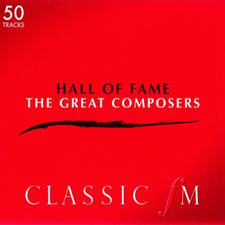The Full Works Concert - Wednesday 8 January 2014
Debussy's Prelude a l'apres-midi d'un faune is the centrepiece of tonight's Hall of Fame Full Works Concert.
Tonight's concert opens with Edward Elgar's Salut d'Amour. The composer wrote the piece in July 1888 as an engagement present for Caroline Alice Roberts. She in return offered him a poem called The Wind at Dawn which she had written years before and which he soon set to music. Tonight it's played by the Royal Liverpool Philharmonic Orchestra conducted by John Wilson.
Peter Donohoe then plays Henry Litolff's Concerto Sinfonique No.4 in D minor. Litolff - a half-Scottish, half-Alsatian pianist - left audiences spellbound with his magical performances from the age of 14. In order that he might continue to enchant concert-goers across Europe, he wrote himself a series of symphonies with a solo piano part. They were not quite concertos — and they weren't quite symphonies either. Instead, they were pieces that were specifically designed to make him sound great when he played them. The Concerto Sinfonique No.4 in D minor is just a joy of a work and is said to have inspired Liszt. So much so, in fact, that he dedicated his own piano concerto to Litolff.
Debussy's Prelude a l’apres midi d’un faune, first performed in 1894, was planned originally as the first part of a trilogy. It was originally to have been followed by an Interlude and a Paraphrase finale. in the end, for reasons best known to himself, Debussy decided to confine all his thoughts on a poem by Stéphane Mallarmé to just one single movement. The composer was 32 years old when he wrote it and it was 18 years later that it was adapted into a ballet, when Vaslav Nijinsky danced to it in Diaghilev’s Ballets Russes production in Paris. This piece is a big turning point in music, perhaps allowing us to hear the traditional system of keys and tonalities being stretched to their limit for the first time.
Handel's Music for the Royal Fireworks was written as a political gesture. In 1748, England and France had signed the Treaty of Aix la Chapelle to mark the end of the War of Austrian Succession which involved just about everyone - the Prussians, the Spanish and the Austrians themselves, as well as the two signatories to the peace treaty. To celebrate the peace, a spectacular display was to be held in London’s Green Park and Handel, the King’s chosen composer was the man to write the music. Sadly the real losers were the thousands of people who flocked to Green Park for the firework display who had to wait for hours and hours because of carriage traffic jams and queues, even for the rehearsal. On the night of the grand display, a wayward firework set light to the specially built Pavilion, which then caused a fight to break out amongst the organisers.
Max Bruch's Scottish Fantasy received its UK premiere while Bruch was rather grumpily in charge of the Liverpool Philharmonic in 1881, some 17 years before he took over at the Scottish Orchestra. Despite the fact that the composer was a virtual stranger to Scotland at the time he wrote his Scottish Fantasy, there is nothing to suggest that the work is based on anything other than wholly authentic Scottish melodies. Its opening movement uses ‘Auld Rob Morris’; from there, we move on to ‘Dusty Miller’, before ‘I’m down for lack of Johnnie’ in the third movement and, to conclude, the ebullient ‘Scots Wha Hae’ in the finale.
Edward Elgar: Salut d'Amour Opus 12
John Wilson conducts Royal Liverpool Philharmonic Orchestra
Henry Litolff: Concerto Sinfonique No.4 in D minor Opus 102
Piano: Peter Donohoe
Andrew Litton conducts Bournemouth Symphony Orchestra
Claude Debussy: Prelude a l'apres-midi d'un faune
Stephane Deneve conducts Royal Scottish National Orchestra
George Frideric Handel: Music for the Royal Fireworks
Alfredo Bernadini conducts Zefiro
Max Bruch: Scottish Fantasy Opus 46
Violin: Itzhak Perlman
Zubin Mehta conducts Israel Philharmonic Orchestra










